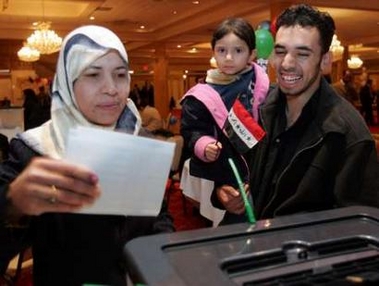|
Troops in place on eve of Iraqi vote
(AP)
Updated: 2005-12-15 08:30 For the Bush administration, the stakes are nearly as high as for the Iraqis.
A successful election would represent a much-needed political victory at a time
of growing doubts about the war among the American public.
"We are in Iraq today because our goal has always been more than the removal
of a brutal dictator," Bush said. "It is to leave a free and democratic Iraq in
its place."
Insurgent threats and boycott calls kept many Sunnis at home in the January
election despite a national turnout of nearly 60 percent. That enabled Shiites
and Kurds to dominate the current legislature, sharpening communal tensions and
fueling the insurgency.
This time, more Sunnis Arabs were in the race, and changes in the election
law to allocate the majority of seats by district all but guaranteed strong
Sunni representation.
More than 1,000 Sunni clerics called on their followers to vote, and
insurgent groups, including al-Qaida in Iraq and the Islamic Army in Iraq,
pledged not to attack polling stations even though they oppose the political
process.

Iraqi expatriate Mushtak Al-Atiyah (R), 24
years old, holds his three-year old daughter Zanabi as he watches his
mother Suzer (L) cast her absentee ballot in Iraq's election at a polling
station in Dearborn, Michigan December 14, 2005. An estimated 240,000
Iraqi's in the U.S. are eligible to vote for Iraq's first parliament since
the overthrow of Saddam Hussein in 2003.
[Reuters] | Nevertheless, tens of thousands of Iraqi soldiers and police were to guard
polling stations, with U.S. and other coalition forces standing ready in case of
trouble. U.S. troops and sniffer dogs checked thousands of polling stations
before handing over control to Iraqi police.
As a sign of Sunni interest, mosques, walls, houses and lamp posts in
Baghdad's Sunni district of Azamiyah were festooned with posters of Sunni
candidates. In January, few people in Azamiyah voted, and some polling stations
didn't even open.
U.S. officials were optimistic about a heavy turnout in Fallujah, the Sunni
insurgent stronghold captured by American forces last year. Campaign posters
were plastered Wednesday over blast walls along the street, at police
checkpoints and on the walls of houses.
"In January, turnout was low. In the referendum it was tremendous and
tomorrow it will be better," said John Kale Weston, U.S. State Department
spokesman in the city.
Still, U.S. officials warned that a successful election alone will not end
the insurgency. Also needed is a government capable of reconciling Iraq's
disparate groups.
The Americans are also eager to avoid protracted negotiations to choose a new
prime minister and Cabinet �� a process that dragged on for three months after
the last vote.
"I think the elections are a positive step, but it will not be enough to
ensure stability. More steps need to be taken. There should be a good government
that represents all Iraqis, and the security forces also should be formed by all
Iraqi sects," U.S. Ambassador Zalmay Khalilzad told Al-Jazeera television.
His comments about the security forces referred to Sunni Arab complaints that
the Shiite-dominated army and police have abused Sunnis. On Tuesday, Khalilzad
said at least 120 abused prisoners had been found in two detention centers run
by the Interior Ministry since November.
On the eve of the election, sectarian tensions swelled over what Shiite
political parties considered an offensive remark made by an Iraqi Shiite
panelist on Al-Jazeera. Fadel al-Rubaei said Shiite clerics should not take part
in politics, and he accused them of conspiring with the Americans against the
mostly Sunni insurgents.
The statements angered many Shiites, including many who did not see the
Al-Jazeera broadcast but saw reports about it on an Iraqi station, Al-Furat,
owned by the biggest Iraqi Shiite party, which used the report to fire up its
supporters.
Hours later, thousands of people chanted anti-Al-Jazeera slogans in the
streets of the Baghdad neighborhoods of Sadr City and Karradah, and in major
cities throughout the Shiite south.
In Nasiriyah, Shiite protesters set fire to a building housing the offices of
former interim Prime Minister Ayad Allawi, a secular Shiite, and the Iraqi
Communist Party.
"The headquarters was attacked by militiamen who broke inside and set fire to
the building. This is a terrorist act that contradicts democracy and this is the
reason we are calling for eliminating the militia groups in Iraq," Allawi
spokesman Thaer al-Naqib told The Associated Press.
Officials at the Qatar-based Al-Jazeera were not available for comment. But
Baghdad correspondent Atwar Bahjat told the AP she resigned from her job "in
protest of what the guest of the station said."
Rumors swept Baghdad that a tanker truck filled with thousands of blank
ballots had been smuggled into the country from Shiite-dominated Iran. Many
Sunnis consider Shiite political parties as agents of Iran.
The Interior Ministry denied any attempt to smuggle ballots, and the election
commission said the only trucks in the area were its own delivering election
materials to polling stations.
|